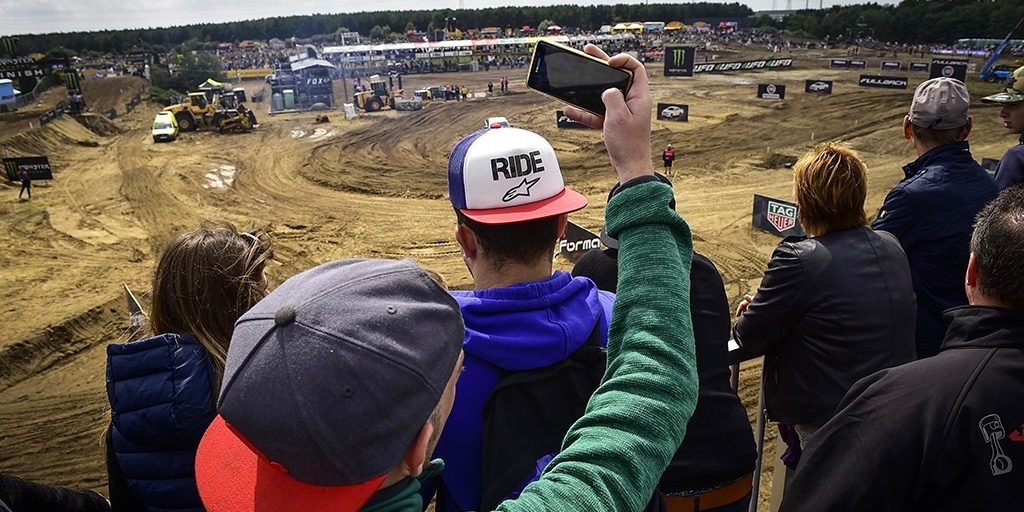The dirtbike world has been infiltrated by an evil force known as social media and we want to know how it affects riders.
It’s the elephant in the room that no one wants to talk about. You know it. I know it. We all know it. We are so brainwashed that we can no longer fight it. It’s just there. And while we all lament it and wish that it didn’t exist, we can’t live without it. It’s called social media, and it has taken over the world.

BEST AND WORST
ADB Motocross Editor Lee Hogan knows all about it and has been involved with the industry as a rider, coach and manager of the BCP Pro Circuit Honda Junior Development team. “I think technology, whether you’re talking the internet or mobile phones, has given us the best and worst of everything,” says Hoges.
“It’s made a lot of things easier but it’s also made a lot of things harder.”
Social media has its benefits. It can be used as a marketing tool both for current and prospective sponsors and also as a way to connect with the fans.
Back in the day, if you did a cool video or photoshoot, punters would have to wait until the DVD dropped or the magazine article came out. Now, Josh Sheehan can do a triple backflip and within minutes, it’s beamed all around the world on social media.
But it’s not all sunshine and roses. There are many downsides to social media. “It can be more of a distraction sometimes,” says Hoges. “I’ve had riders that have been posting in between races. I think you need to have a good perspective of where it sits in the big scheme of things and not let it become too distracting.”
It can be so distracting in fact, that it hinders the riders’ on-track performance. “It can become a case of riders chasing likes, comments and shares and it can become a sort of semi-obsession, which isn’t healthy. There is a fine line between doing too much and being a good representative for your sponsors and team.”
According to Ben Grabham, some riders are using social media in unprecedented ways. Apparently, Ivan Long would watch Instagram and Facebook clips of other riders on the Finke track and he would time himself on the same sections to see if he was faster. This obsessive-like behaviour could easily backfire and result in a meltdown of sorts but, in the case of Long, it appears to have been a positive, as he rocketed to a podium on day two.
SLEAZE
The cyber world can also get you in a bit of hot water. Just ask Husky rider Martin Davalos. The AMA SX/MX rider from Ecuador landed himself in trouble when a Snapchat exchange with a female went viral, painting him as a sleaze and womanizer.
But perhaps the worst aspect of social media is negative feedback. We’ve all heard the stories about kids, and even adults, becoming depressed and even suicidal as a result of cyber bullying. But the truth is that much of the criticism is unjustified and dished out by faceless people who actually don’t know a thing.
When @MetalHead69 tells you that you’re a shit rider and you’ve got an ugly head, you can’t help but feel hurt. The reality is that he’s probably some computer geek taking time out from trolling forums and watching porn and Doctor Who re-runs.
This is the problem. The internet has given people way too much power. As they say, the pen is mightier in the sword, and that is so relevant in social media.
For professional athletes, it’s even worse. Because social media is part of their jobs, athletes experience even more pressure to get the next post up. And because they have so many followers, naturally there is going to be more negative feedback.
“The likes of Chad Reed and Ricky Carmichael have over half a million followers on their Instagram alone,” says Hoges. “But what a lot of people don’t realise is that, on any particular day, someone like Chad will get thousands of positive comments, but they’ll also get hundreds of negative ones.”
Indeed, Reed has seen the negative side of social media and recently said in an interview that he was taking an indefinite break from Facebook, Twitter and Instagram. “I have a lot of time to myself during the day and I just found myself looking at my phone all the time,” he told Steve Matthes.
So how can we educate riders, in particular young riders, to successfully and positively use social media?
LAUNDRY
“We could talk for hours on the subject,” says Hoges. “But the main thing I would say it to not air your dirty laundry on social media. That could come down to a number of different things. It could be that you just had a fight with your misses and you decide to vent online.
“Or it could be that you had a bad race on the weekend, so you get on there and say we’ve got a major problem with the bike. This kind of thing doesn’t represent you or your sponsors very well.”
Hoges recommends putting your phone away on race day. “The way I see it from a business perspective, is that there really isn’t any need to be posting stuff in the middle of the day. You could be out checking lines on the track or getting your goggles ready, or having a drink or banana. I almost think that you’re bringing a bit of bad karma on yourself. You could be doing more to get a good result.
“If you want to have a look at your social media on the way to the track, that’s fine. But once you start your day, whether you’re a concreter or a lawyer, I don’t believe you should be flicking through your social media. And I think we need to treat our sport as a proper job.”
As for the negative feedback, Hoges believes it’s hard to avoid it. “You can try to be evasive and not read the comments, but sooner or later, you’ll end up seeing stuff,” he says. Rather than avoiding the negatives, riders should know that usually these negative comments have no credibility and are most likely written by people who have nothing better to do.
So who should young riders look at as a role model for social media use? “Ricky Carmichael has got a good subtle way of doing his stuff,” says Hoges. “He regularly posts throwback photos and then he’ll throw in some new stuff. Every so often he’ll post a photo of one of his mates asleep on a plane or something. Ricky seems to have a pretty good balance of stuff on there and you never think to yourself that you need to unfollow him because he’s posting annoying stuff.”
The bottom line is that social media is good and bad. But regardless of our opinions, it’s hard to avoid. As Uncle Ben once said, with great power comes great responsibility. So to all the kids out there, learn to use it wisely. But also know that it doesn’t hurt to switch off and experience the real world once in a while.
Dylan Ruddy
Read the full story in ADB issue #456.
